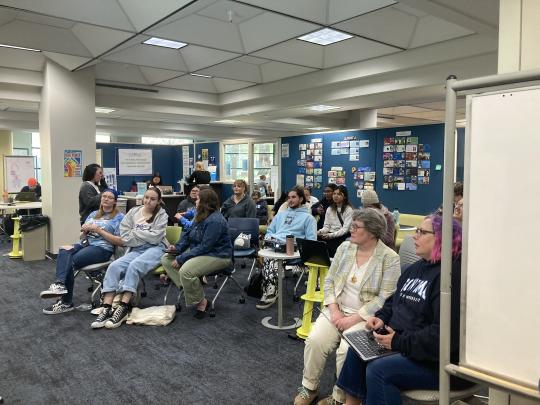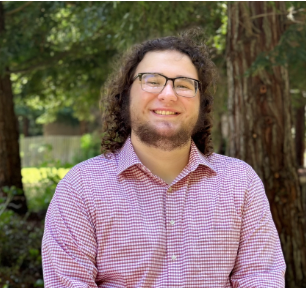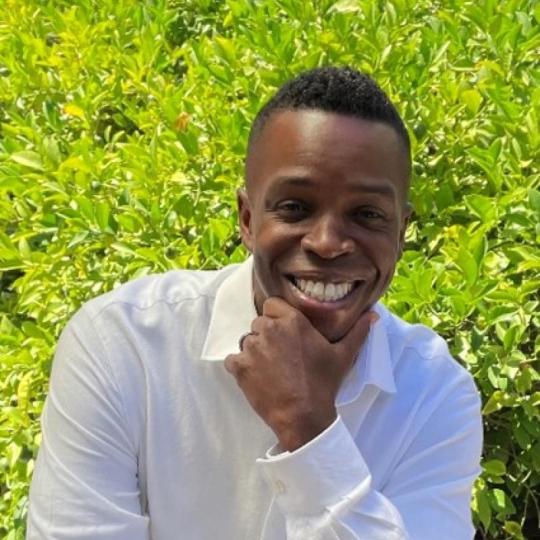The Latest at LARC
Spring 2024 SPOTLIGHT Edition
In this Edition
Upcoming LARC Event
Mark your calendars for Papers, Problems, and PJs! This popular study night series will take place from 5 pm to 9 pm, on the following dates: May 7-9, and 12-14. We offer free drop-in tutoring sessions, plus we have snacks, beverages, limited free printing, comfy couches, and more! (And you can wear your pajamas). MORE DETAILS TO COME!
Spring Event Review: Grad Slam Watch Party at the LARC

LARC hosted our first ever Grad Slam Watch Party on April 5th! The house was packed as we watched five SSU graduate students condense their research work into 3 minutes and one slide. Two presenters - Hale Garcia-Dean (2nd place) and Madison Stein (1st place) - will be heading on to the state competition on May 3rd. We are hoping to host another watch party for the finals at 1pm that day, so keep an eye on our social media!
LARC Alum Spotlight: Jack Van Dine

Jack Van Dine, B.A., English, SSU Class of 2023, current MA/PhD student, English, Ohio State University
Tell us about your experience of finding the LARC. What brought you here?
I found the LARC through the recommendation of a friend! Before I applied, I decided to make an appointment with the Writing Center myself and had a great experience. After a great appointment, I decided to apply to be a tutor, and I loved it!
How did the Writing Center help augment your scholarly experience at SSU?
The Writing Center was a massive help with my work. Working for the LARC and making appointments myself really forced me to think through my scholarly work in a different frame than I would have without it. Tutoring others is a great way to notice everything that you do in your work, and having others help reframe your thoughts is a really invaluable resource, and the Writing Center does a wonderful job creating a space for that.
What are your favorite memories of tutoring?
That’s tough. I have a lot of really great memories from tutoring, but I think one that stands out was from my first semester. I had a student in the English 99T program* who had a lot of difficulties, and over the course of the semester, we worked together to face those challenges in their writing. Toward the end of the semester, that student applied for a challenging program, and when they came in for their normal appointment after finishing the application that weekend, they said that they remembered everything we had talked about while they rewrote most of their work. They ended up being accepted into the program! It was incredibly rewarding to see a student succeed because of what I was able to help them work on.
*Engl 99T is a one unit credit/no credit course that provides students with a reserved weekly session with a peer writing tutor
What did you learn as a Writing Center Tutor that you have carried into your Ph.D. work?
Oh loads. Every time I sit down to write, I try to approach my own work as though I were tutoring myself. My experience as a tutor has really allowed me to be critical yet supportive of myself and my writing. It also really helps me approach others’ work as well. A lot of graduate work is independent, but we often read through and help each other with fresh eyes, and I think of that as a type of tutoring too. Being able to process and understand another person’s work without being immediately critical is really important, especially when everyone is working on rather niche subjects that we may not have the luxury of knowing in depth. In those situations, I think of all of the students I had worked with outside of my field, and I try to apply some of those tools to my peers’ works.
What is it like pursuing a Ph.D. in English at a top university? Do you ever use any lessons you learned here in your current work?
It is incredibly challenging, rewarding, but challenging. I think the biggest thing about a grad program though is that it has really changed the way that I think, both about my subject, and the world a little more generally. I have to be critical and question what I’m doing while taking in so much more information about methods, ideas, events, concepts, and work that I had no clue existed when I was an undergrad. I end up using a lot of the lessons I learned, but now I have to be critical of those methods in a fashion that I was not before.
Is there anything else you would like to share about your passion for writing?
It is so much easier to write when you’re invested. That investment can be minuscule, but I’ve found that I have so much more passion and ability to write when I can find any part that I can apply back to my own ideas and field. You’ll be better served writing a good and passionate paper that takes some of the ideas of a course and fits them in such a way that you can use it for your own, than trying to force yourself to write with no investment. So even if you hate a prompt, the source material, or the class, it’s important to find something that you can invest yourself in; your writing will be better for it.
Are there any scholarly events such as conferences or publications you are participating in this year?
As a first-year student, I’m really just trying to start getting a hold of what conversations are happening in the field. I’m presenting at a conference for Medieval studies (my paper focuses on Ælfric of Eynsham) and attending the International Conference for Medieval Studies, but I may have a couple of projects to work on over the summer.
We wish Jack Van Dine tremendous luck as he continues his scholarly journey. Jack and other LARC Alums continue to make the LARC proud of their work after SSU. We hope to keep connecting with them via our LinkedIn and our social media so that we may share their stories about joining our LARC Community, their wonderful contributions to our team, and the ways they carry these experiences of peer tutoring and professional development into their next adventures.
-Barb Beatie, LARC Writing Tutor 2021-present, LARC Lead Tutor 2022-2023, LARC Social Media Coordinator, 2023-2024
Faculty Partner Spotlight: Dr. Manza Atkinson, Chemistry

Pronouns:
He/él/him
Education:
Post-Doctoral Fellow, Harvard University, 2014
Ph.D., Chemistry, University of Iowa, 2011
B.S., Chemistry, North Carolina Agricultural and Technical State University, 2004
Dr. Manza joined the Sonoma State University department of chemistry as a lecturer in the fall of 2020. He currently teaches introduction to general chemistry (CHEM110) and Racism and Sexism in Science (CHEM301). Dr. Manza continues to be motivated by the passion, interests, goals, and resilience of the students at Sonoma State University. He appreciates the students giving him the opportunity to serve as their instructor. His mission is to help equip them with a deeper knowledge of chemistry and more recently, ways to create equity in our society, so they may better understand their role and responsibilities in the world, whether as scientists or through their desired career path. This will help them go on to find solutions to challenges within our local and global communities.
He enjoys spending time with his family, coaching, mentorship, and civic engagement. He has coached hundreds of kids in boys and girls basketball, girls volleyball, tennis, and lego robotics. He currently serves the local community as a member of several boards. He serves as the faculty co-chair of the Black Faculty and Staff Association (BFSA) here at Sonoma State. He serves as member of the Public Safety and Prevention Tax (Formally Measure O) Oversight Committee in Santa Rosa, California, where he helps to oversee the use of funding allocated to the police department, the fire department, and gang-violence prevention programs. As a board member of our local little league organization, he volunteers as the sponsorship coordinator to help financially support kids having fun playing and learning the game of baseball. He also served as board member of Siyan Clinical Research, an organization that is dedicated to advancing knowledge of biopsychosocial treatment of psychiatric disorders by conducting quality, science-based research studies to improve the quality of psychiatric care.
He is currently looking to connect the students of SSU, the institution, and local organizations on ways to collaborate that allows us to apply current scientific knowledge to solve problems within the local community. He is working to collaborate to the investigation of microplastic contaminants in the waterways of Sonoma County. With the help of talented students, the Russian River Keepers, Santa Rosa Junior College, and internal mini-grants from the Research, Scholarship, and Creative Activity Program (RSCAP) and the Center for Environmental Inquiry (CEI-WATERS).
Where Can You See More?

We have very active Social Media channels (@ssularc), so check us out (and follow us!) on Instagram, Facebook, and now LinkedIn! We share LARC and Campus events, celebrate holidays, offer study and writing tips from our staff, and we occasionally feature student staff on our IG Takeover Tuesdays! Here you can follow along on a day-in-the-life of a Tutor or Supplemental Instruction (SI) Leader!
Looking for past editions?
Please check out our Newsletter Archive. Past editions are provided in an accessible PDF format.

